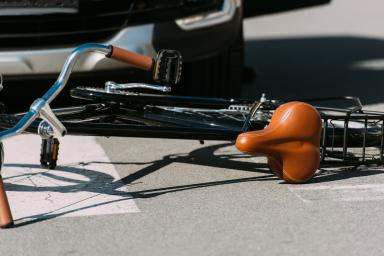Alabama Bicycle Laws

According to the Alabama Department of Transportation’s latest accessible data, 220 bicyclists were involved in accidents throughout the state in 2020. 86% of the total accidents occurred on urban streets, while 43% of the crashes were caused by bicyclists themselves. A total of 168 cyclists were injured, while eight perished. Most of the state’s wounded riders were people aged between 51 and 60, followed by those aged between 31 and 40.
Because bicyclists are more vulnerable to injuries or death from accidents than motor vehicle drivers, traffic laws and guidelines are in place to ensure that those riding bicycles are on Alabama roads. These guidelines cover helmet and equipment requirements and ways bicyclists can navigate roadways with other motor vehicles safely.
Alabama also has legal statutes to guide bicyclists as they try to obtain compensation for their damages in case they get into an accident. These statutes dictate how much a bicycle accident victim can potentially recover, what insurance policies apply to their claims, and how long they have to file an injury claim or lawsuit against liable parties. Bicycle accident lawyers use these statutes and other laws to prosecute cases against at-fault motorists.
Alabama’s Bicycle Helmet and Equipment Regulations
Alabama safety laws require all bicyclists under the age of 16 to wear a helmet that complies with the quality and safety standards of the Snell Memorial Foundation or ASTM International. Helmets must fit snugly around the wearer’s head and be secured in place with a chinstrap to prevent them from moving in any direction. Those who fail to wear helmets must undergo bicycle safety counseling, while their parents or guardians may be fined up to $50. Repeated offenses can result in the temporary confiscation of their bicycles.
In addition to a helmet, bicyclists are encouraged to wear retro-reflective or brightly colored clothing, along with similar gear for their wrists, backs, and legs, to make them more visible to other motorists. Their bicycles must be equipped with rear-view mirrors, and their tires and brakes must always be in proper working condition.
Alabama law also requires bicycles used during nighttime to be equipped with a front lamp that emits a white light visible from a minimum distance of 500 feet. For the rear, they must have a red reflector visible from 100 to 600 feet from all distances and when in front of the lower beams of a motor vehicle’s headlamps. To supplement such a reflector, bicyclists may attach a lamp emitting a red light visible from a minimum distance of 500 feet.
Alabama’s Bicycle Safety Guidelines
When riding a bicycle in Alabama, a person must always follow the same traffic ordinances that other motorists adhere to since bicycles are considered vehicles. Safety guidelines for bicyclists include the following:
Obey traffic signs and signals
Always ride on the right side of a street, moving in the same direction as other vehicles on the same lane; never ride against oncoming traffic.
Always check for cracks, potholes, or drainage grates on the road
Ride at safe speeds during wet weather
Never use a bicycle to carry more people than it was designed and equipped for
When stopping, extend your left or right arm with the elbow bent downward
When turning left, extend your left arm at shoulder height horizontally
When turning right, bend your right arm at shoulder height horizontally; as an alternative, extend your left arm with the elbow bent upward
When crossing an intersection, entering streets, or exiting driveways, watch and wait for approaching vehicles in all directions first before proceeding
When crossing a busy intersection, walk with your bicycle on a crosswalk while still taking traffic signals into account
When riding with other people, ride in single file on streets
Additionally, Alabama laws dictate that two bicycles may not ride abreast except on paths specifically designated for bicycle use. If such paths are present next to a roadway, bicyclists must use them instead of the roadway when riding. Bicyclists must also not cling onto any vehicle on a roadway or carry items or cargo that prevent them from having at least one hand on their bicycle’s handlebars.
Alabama’s DUI Law for Bicyclists
Bicycles are considered vehicles in Alabama; state laws prohibit people from operating a bicycle while under the influence of alcohol or any controlled substances that impair their ability to ride safely. In terms of alcohol, a bicyclist will be charged with DUI if their blood alcohol concentration reaches or exceeds a level of 0.08 percent. For those under the age of 21, the threshold is 0.02 percent.
Potential penalties for a DUI conviction include a minimum fine ranging from $600 to $4,100, depending on how many violations a person has committed. Additionally, a DUI offender may be required to undergo 30 days of community service or serve at least five days in jail. Repeat offenses may lead to imprisonment lasting from a minimum of 60 days to a maximum of 10 years.
Is Alabama a No-fault State for Bike Accidents?
No, Alabama is not a no-fault state when it comes to bicycle accidents. Instead, the state follows at-fault guidelines for any injury claims resulting from such mishaps. This means that the party responsible for a bicycle accident will be held financially responsible for the damages to those involved.
In order to pay for a bicyclist’s losses in terms of medical expenses and repair costs after an accident, motorists must use their auto liability coverage, which they must have when owning and operating a vehicle. According to the Alabama Department of Insurance, the minimum amounts required for auto liability coverage are:
$25,000 for bodily injuries per person
$50,000 for bodily injuries per accident
$25,000 for property damage
Additionally, bicyclists may use uninsured or underinsured motorist coverage to recover damages if the driver who caused the accident has insufficient or no insurance. Uninsured motorist coverage can also be used if the at-fault driver flees from the accident scene since any driver who does so is considered uninsured. Under Alabama law, people can file uninsured motorist claims even if there was no physical contact with another vehicle in an accident. In bicycle accidents, this can apply if a bicyclist crashes while trying to avoid a collision with another vehicle.
Many bicyclists do not realize that their auto insurance covers them for uninsured or underinsured motorists accidents even though they are not occupying their motor vehicle when the accident occurs. Additionally, uninsured and underinsured motorist coverage can be stacked in Alabama, meaning that bicyclists can combine coverages to increase the total amount of insurance funds that are available.
However, it should be noted that Alabama follows the rule of contributory negligence for bicycle accident cases. Under this rule, plaintiffs will be barred from recovering any damages if they are partially liable for an accident in any way, regardless of their percentage of fault.
How Much Can Someone Sue for a Bicycle Accident in Alabama?
Alabama does not limit the total amount of compensatory damages that bicycle accident victims may recover, allowing plaintiffs to potentially recover their losses in full. Compensatory damages include expenses for medical costs and rehabilitative care, as well as repair expenses and lost income. They can also include non-monetary losses related to a victim’s pain and suffering, emotional distress, and loss of consortium.
Alabama courts may also award punitive damages in cases where it is proven that the defendant in an accident case willfully disregarded the victim's safety or acted with intent to harm. For such damages, the state imposes the following limits:
$500,000 or three times the amount of compensatory damages awarded to the plaintiff (whichever is greater) if the case does not involve physical injury
$1,500,000 or three times the amount of compensatory damages awarded to the plaintiff (whichever is greater) if the case involves physical injury
If an accident results in wrongful death, the deceased victim’s dependents may only recover punitive damages based on Alabama law. This is because the state focuses on punishing a defendant’s negligence instead of alleviating the plaintiffs' losses in wrongful death cases. In such scenarios, however, Alabama no longer limits the amount of punitive damages a victim’s dependents can get.
What Is Alabama’s Statute of Limitations for Bicycle Accidents?
Alabama’s statute of limitations for bicycle accidents is two years, starting from the date of the accident in question. Those who miss this two-year filing period will likely have their claim or lawsuit dismissed in court if they try to file past the deadline. Wrongful death cases also follow the same deadline, with the statute beginning on the decedent’s date of death.
The statute of limitations can be “tolled” or suspended in cases where the person entitled to take legal action is a minor or legally insane. In these cases, the individual will have up to three years to file an injury claim or lawsuit once they reach the age of 19 or recover from insanity. However, the statute cannot be extended beyond 20 years from the date of the underlying accident.
Another exception to Alabama’s statute of limitations applies if the defendant in an accident case is absent from the state when a plaintiff takes legal action against them. Under such circumstances, the period of the defendant’s absence will not be counted as part of the statute’s period.
There are exceptions where a deadline to file a claim can be shortened. For example, if the defendant is a municipal or county employee or entity then the plaintiff must file a notice of claim within six months and one year, respectively.
Legal Resources for Alabama Bicycle Accident Victims
Alabama State Bar
The Alabama State Bar website has several public services available for state residents with legal concerns. It has a Lawyer Referral Service program that connects people with specific attorneys that match their location and legal needs. Those who wish to apply for the program’s services can do so by dialing 1-800-392-5660 or completing the Lawyer Referral Service form. People can also visit the website for information on how to submit requests for public records. To request a specific record, they must complete the Request for Public Records Form and mail it to the address indicated on the website. Records are furnished once a calculated service and release fee has been paid.
Alabama Law Enforcement Agency - Crash Report Purchases and Public Records Requests
Those involved in accidents within Alabama can purchase copies of crash reports on the Alabama Law Enforcement Agency’s website, with each copy costing $15. They may also purchase a report from any ALEA Driver License Office in the state. Additionally, state residents seeking copies of public records can submit their requests by completing the form found on the ALEA website. They must pay a response fee of $20, a copying fee of $.50 per page, and an additional fee of $20 per hour for time-intensive requests.
Alabama Judicial System
State residents can visit the Alabama Judicial System’s website to access links to different electronic filing systems and applications. These include AlaFile and C-Track E-filing, which allow licensed attorneys to submit and request electronic copies of court documents and track specific cases in different courts within the state on behalf of plaintiffs. In addition, the website has links directing to information involving appellate courts and rules of court.
Expertise.com StaffAuthor
Step into the world of Expertise.com, your go-to hub for credible insights. We don't take accuracy lightly around here. Our squad of expert reviewers, each a maestro in their field, has given the green light to every single article you'll find. From rigorous fact-checking to meticulous evaluations of service providers, we've got it all covered. So feel free to dive in and explore. The information you'll uncover has been stamped with the seal of approval by our top-notch experts.

Hunter GarnettReviewer
Hunter Garnett is an experienced personal injury attorney in Alabama. He grew up on a farm as the oldest of seven children and learned the importance of hard work and helping others at an early age. He prides himself in his ability to assist folks recovering compensation for a wide variety of cases in AL. Visit: https://huntsvilleinjurylawyers.com/




